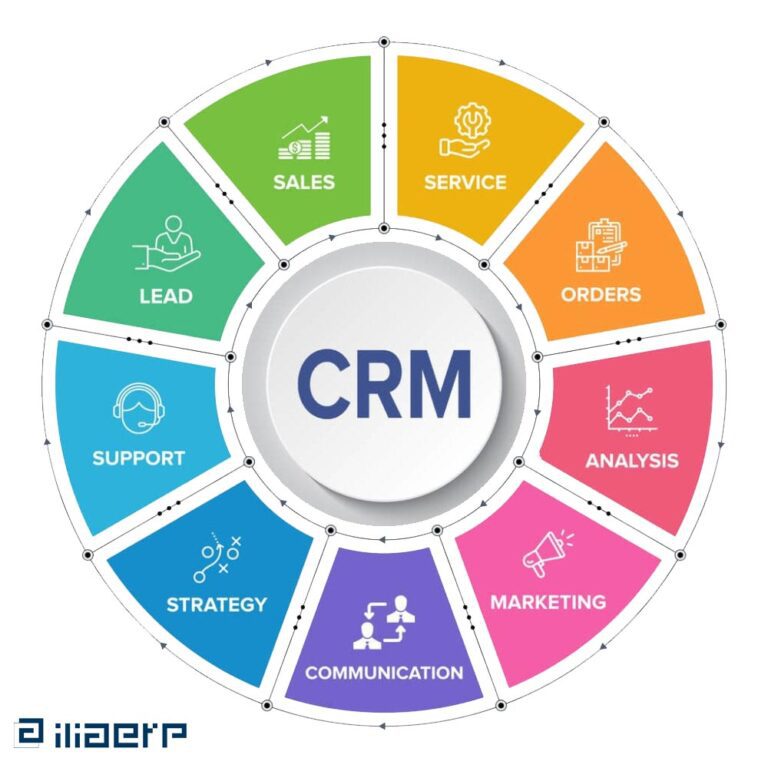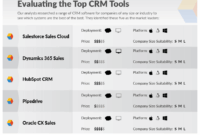AI-powered CRM software is revolutionizing how businesses manage customer relationships. No longer are CRMs simply databases; they are intelligent systems capable of automating tasks, predicting behavior, and personalizing interactions. This guide explores the core functionalities, implementation strategies, and future trends of this transformative technology, empowering businesses to leverage AI for enhanced customer engagement and improved business outcomes.
From automating mundane tasks like data entry and lead qualification to providing insightful predictions about future sales and customer churn, AI-powered CRMs offer a significant competitive advantage. This enhanced efficiency allows sales and marketing teams to focus on high-value activities, ultimately leading to increased revenue and stronger customer relationships. Understanding the capabilities and limitations of these systems is crucial for successful implementation and maximizing return on investment.
Top Features of AI-Powered CRM Software
AI-powered CRM software is revolutionizing how businesses manage customer relationships. By leveraging artificial intelligence, these systems automate tasks, improve efficiency, and provide valuable insights that drive better decision-making. This results in increased sales, improved customer satisfaction, and ultimately, stronger business growth. The core functionalities revolve around automating repetitive processes, predicting customer behavior, and personalizing interactions at scale.
AI-Driven Automation Capabilities
AI significantly enhances CRM functionality through automation. Repetitive tasks like data entry, lead qualification, and email marketing are handled automatically, freeing up sales and marketing teams to focus on higher-value activities. This automation leads to increased productivity and reduced operational costs. For example, AI can automatically update customer information from various sources, ensuring data accuracy and consistency across the CRM system. It can also segment customers based on their behavior and preferences, allowing for targeted marketing campaigns with higher conversion rates. Furthermore, AI-powered chatbots can handle basic customer inquiries, providing instant support and freeing up human agents for more complex issues.
Comparison of AI Features in Leading CRM Software
The following table compares AI features offered by some leading CRM providers. Note that features and specific capabilities can vary based on the chosen package and ongoing development.
| Vendor | Feature 1: Predictive Lead Scoring | Feature 2: Automated Lead Routing | Feature 3: Sales Forecasting |
|---|---|---|---|
| Salesforce Einstein | Predicts lead conversion probability based on various factors. | Automatically assigns leads to the most appropriate sales representative. | Provides sales forecasts based on historical data and predictive modeling. |
| Microsoft Dynamics 365 | Scores leads based on their likelihood to convert, considering engagement and demographics. | Routes leads based on predefined rules and AI-driven insights. | Offers sales forecasting tools with visualizations and trend analysis. |
| HubSpot | Utilizes machine learning to score leads and identify high-potential prospects. | Automates lead distribution based on team capacity and lead characteristics. | Provides sales forecasting capabilities integrated with marketing analytics. |
AI Enhancement of Lead Scoring and Prioritization
AI significantly improves lead scoring and prioritization by analyzing vast amounts of data to identify high-potential prospects. Instead of relying on simple rules-based systems, AI uses machine learning algorithms to identify patterns and predict the likelihood of a lead converting into a customer. For example, AI can analyze website activity, email engagement, and social media interactions to create a more accurate lead score. This allows sales teams to focus their efforts on the most promising leads, increasing conversion rates and improving sales efficiency. A company selling high-value software might use AI to identify leads who have visited specific product pages multiple times and downloaded relevant white papers, indicating a higher level of interest and purchase intent.
Benefits of AI-Driven Sales Forecasting
AI-driven sales forecasting provides more accurate and reliable predictions compared to traditional methods. By analyzing historical sales data, market trends, and other relevant factors, AI algorithms can identify patterns and predict future sales with greater precision. This enables businesses to make more informed decisions about resource allocation, inventory management, and strategic planning. For instance, a retail company using AI-driven forecasting might anticipate a surge in demand for a particular product during the holiday season, allowing them to adjust their inventory levels and staffing accordingly, preventing stockouts and maximizing sales opportunities. This proactive approach minimizes risks and maximizes opportunities for growth.
Integration and Implementation of AI-Powered CRM Software
Integrating AI-powered CRM software effectively requires careful planning and execution. Success hinges on understanding the existing infrastructure, data compatibility, and the specific needs of the business. Challenges exist, but with a well-defined strategy, the benefits of enhanced customer relationships and operational efficiency can be fully realized.
Challenges of Integrating AI-Powered CRM with Existing Systems
Integrating AI-powered CRM software with existing business systems presents several challenges. Data silos, incompatible data formats, and the need for robust data migration strategies are common hurdles. Legacy systems may lack the necessary APIs for seamless integration, requiring custom development or workarounds. Furthermore, ensuring data security and compliance throughout the integration process is paramount. The complexity of the integration process itself can also lead to delays and increased costs if not properly managed. For instance, integrating a new AI-CRM with a legacy ERP system that uses a proprietary database format might require extensive data transformation and mapping, delaying the go-live date and increasing implementation costs.
Step-by-Step Implementation Plan for AI-Powered CRM Software
A successful implementation follows a structured approach. The process typically begins with a thorough needs assessment, identifying specific business objectives and defining key performance indicators (KPIs). This is followed by selecting the appropriate AI-powered CRM software, considering factors like scalability, customization options, and vendor support. Next, data migration and integration are crucial, ensuring data accuracy and consistency. Thorough testing and user training are essential before the final rollout. Post-implementation monitoring and ongoing optimization are critical for maximizing ROI. For example, a company might start with a pilot program in a single department to test the software’s effectiveness before a full-scale deployment across the organization.
Types of Data Integrated with AI-Powered CRMs and Their Impact on Performance
Various data types significantly enhance AI-powered CRM performance. Customer data (demographics, purchase history, interactions), sales data (leads, opportunities, deals), marketing data (campaign performance, website analytics), and service data (support tickets, customer feedback) all contribute to a more comprehensive customer profile. Integrating these data sources allows for more accurate predictions, personalized experiences, and improved decision-making. For instance, integrating marketing campaign data with customer purchase history allows for targeted marketing efforts, leading to higher conversion rates. Similarly, integrating customer service data with sales data can help identify at-risk customers and proactively address their concerns.
Key Considerations for Choosing an AI-Powered CRM Provider
Choosing the right provider is crucial for successful implementation.
- Scalability and Flexibility: The chosen system should be able to adapt to the company’s growth and changing needs.
- Integration Capabilities: Seamless integration with existing systems is essential for optimal data flow.
- AI Capabilities: Evaluate the specific AI features offered and their relevance to business goals. Consider the sophistication of the AI algorithms and their ability to handle large datasets.
- Security and Compliance: Ensure the provider meets industry security and data privacy standards.
- Vendor Support and Training: Robust support and comprehensive training are crucial for successful adoption.
- Cost and Return on Investment (ROI): Carefully assess the total cost of ownership and potential ROI.
Impact and Future Trends of AI-Powered CRM Software
The integration of artificial intelligence into CRM systems is revolutionizing customer relationship management, significantly impacting businesses across various sectors. AI-powered CRMs offer capabilities far exceeding those of traditional systems, leading to enhanced efficiency, improved customer experiences, and ultimately, increased profitability. This section explores the profound impact of AI on CRM and outlines the exciting future trends shaping this rapidly evolving field.
AI-powered CRMs are transforming how businesses manage customer interactions. This shift is driven by AI’s ability to automate tasks, analyze vast amounts of data, and provide actionable insights that were previously unattainable. This leads to a more proactive, personalized, and efficient approach to customer relationship management.
AI-Powered CRM vs. Traditional CRM: A Comparative Analysis
Traditional CRM systems primarily focus on data storage and basic reporting. They often require manual data entry, lack predictive capabilities, and struggle to handle the sheer volume of data generated in today’s digital landscape. In contrast, AI-powered CRMs automate many manual tasks, such as lead scoring and data entry, freeing up human resources for more strategic activities. Furthermore, AI algorithms can analyze customer data to identify patterns and predict future behavior, enabling proactive engagement and personalized marketing campaigns. This predictive capability is a key differentiator, allowing businesses to anticipate customer needs and address potential issues before they escalate. The result is a more efficient and effective customer relationship management strategy. For example, a traditional CRM might simply record customer interactions, while an AI-powered CRM could predict churn risk based on past behavior and suggest proactive interventions to retain the customer.
Enhancing Customer Experience and Satisfaction with AI
AI-powered CRMs significantly improve customer experience through personalization and proactive support. By analyzing customer data, AI can identify individual preferences and tailor interactions accordingly. This could involve recommending relevant products or services, providing personalized offers, or anticipating potential customer needs. Furthermore, AI-powered chatbots can provide instant support, resolving simple queries and freeing up human agents to handle more complex issues. This immediate responsiveness enhances customer satisfaction and reduces wait times. For instance, an AI-powered chatbot can answer frequently asked questions about shipping times or product specifications, ensuring customers receive quick and accurate information without needing to contact a human representative. This immediate support leads to improved customer satisfaction and loyalty.
Future Evolution of AI-Powered CRM Software
The future of AI-powered CRM software is bright, with several emerging technologies and functionalities poised to further revolutionize the field.
- Hyper-Personalization: AI will continue to refine its ability to personalize customer interactions, moving beyond basic segmentation to deliver truly unique experiences tailored to individual customer needs and preferences in real-time.
- Predictive Analytics Enhancement: AI algorithms will become increasingly sophisticated, enabling more accurate predictions of customer behavior, including churn risk, purchase intent, and lifetime value. This will allow businesses to optimize their marketing efforts and improve customer retention.
- Integration with Emerging Technologies: We can expect seamless integration with technologies like the Metaverse and Web3, enabling immersive customer experiences and new opportunities for engagement. Imagine personalized virtual showrooms or interactive product demos within a virtual environment.
- Enhanced Automation: AI will automate even more complex tasks, such as contract negotiation and lead qualification, freeing up human resources for higher-value activities. This will lead to increased efficiency and reduced operational costs.
- Explainable AI (XAI): The focus on explainable AI will increase transparency and trust in AI-driven decisions, allowing businesses to understand the reasoning behind AI recommendations and ensure ethical and responsible use of the technology.
Closing Summary
In conclusion, AI-powered CRM software represents a significant advancement in customer relationship management. By automating processes, providing predictive insights, and personalizing customer interactions, these systems empower businesses to achieve unprecedented levels of efficiency and customer satisfaction. While implementation requires careful planning and consideration, the potential benefits—increased sales, improved customer loyalty, and data-driven decision-making—make the investment worthwhile for businesses seeking to thrive in today’s competitive landscape. The future of AI-powered CRMs promises even more sophisticated capabilities, further blurring the lines between technology and human interaction in the pursuit of exceptional customer experiences.



